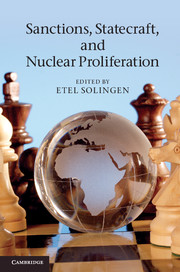Book contents
- Frontmatter
- Contents
- Figures
- Tables
- Contributors
- Preface and acknowledgments
- Part I Anatomy of inducements
- 1 Introduction
- 2 Sanctions, inducements, and market power
- 3 Empirical trends in sanctions and positive inducements in nonproliferation
- Part II Competing perspectives
- 5 An analytically eclectic approach to sanctions and nonproliferation
- 6 Threats for peace?
- Part III Reassessing the record: focused perspectives
- Part IV Conclusions: understanding causal mechanisms and policy implications
- References
- Index
- References
1 - Introduction
the domestic distributional effects of sanctions and positive inducements
Published online by Cambridge University Press: 05 June 2012
- Frontmatter
- Contents
- Figures
- Tables
- Contributors
- Preface and acknowledgments
- Part I Anatomy of inducements
- 1 Introduction
- 2 Sanctions, inducements, and market power
- 3 Empirical trends in sanctions and positive inducements in nonproliferation
- Part II Competing perspectives
- 5 An analytically eclectic approach to sanctions and nonproliferation
- 6 Threats for peace?
- Part III Reassessing the record: focused perspectives
- Part IV Conclusions: understanding causal mechanisms and policy implications
- References
- Index
- References
Summary
In June 2009 the streets of Tehran were burning, literally and figuratively. The Obama administration faced a crucial dilemma in its effort to prevent Iran from acquiring nuclear weapons. Should President Obama openly support the persecuted opposition, as some argued, and if so, what language should he use? Should he abstain from any response, so as to avoid intruding in the internal turmoil brewing within Iran’s regime? Should the US administration “talk” to Ahmadinejad or to his competitors within Iran’s ruling coalition? Should the nuclear issue be raised in the repressive post-election context to signal the economic and other opportunity costs of the regime’s behavior for the Iranian public? Could positive outreach by the president toward the Iranian regime yield any fruit? Were positive inducements offered too little or too much? Were sanctions too punitive or toothless? Was support extended to Iran’s (and Syria’s) opposition adequate considering stronger endorsement of popular uprisings in Egypt, Libya, and Tunisia in early 2011? Are security assurances to nuclear proliferators a proven means to obviate their quest for nuclear weapons?
The intractability of these dilemmas is the subject of extensive public discussion worldwide. Notably, the international relations scholarly literature on sanctions and nuclear nonproliferation offers limited answers to most of these questions and has largely neglected more systematic analysis of the domestic distributional consequences of external attempts to influence target states’ nuclear postures. A domestic distributional focus requires particular attention to cui bono (who gains) and cui malo (who loses) from sanctions and positive inducements, and how those, in turn, affect the outcome. This volume thus seeks to contribute to the study of nonproliferation statecraft in several ways.
- Type
- Chapter
- Information
- Sanctions, Statecraft, and Nuclear Proliferation , pp. 3 - 28Publisher: Cambridge University PressPrint publication year: 2012
References
- 4
- Cited by



